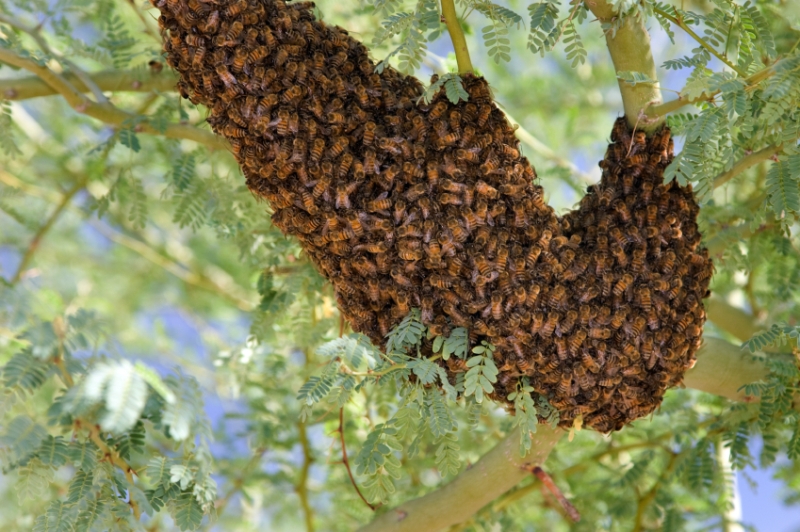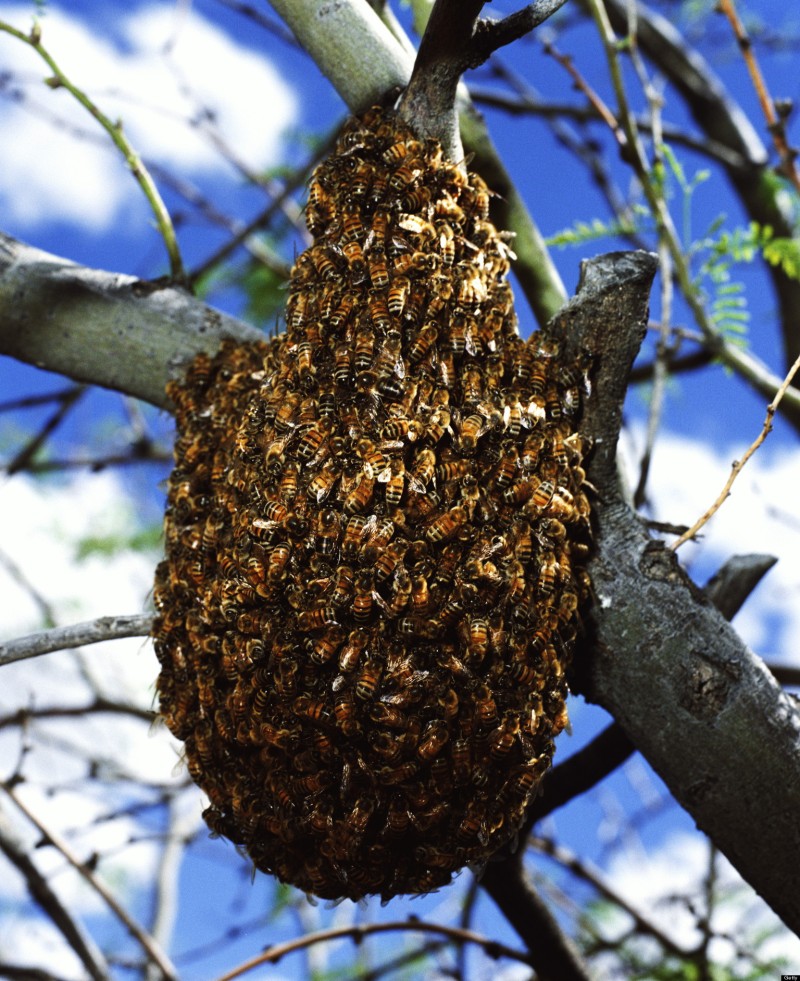
WHY AFRICANIZED BEES ARE SO NEGATIVE PORTRAYED
AND
WHAT IS REALITY ABOUT THEM ?

“Science must begin with myths and with the criticism of myths.”
-Karl Popper
Hollywood is always guilty for shaping the common sense in wrong direction. It seems that magical production of lies and myths has never managed to be moderate but rather extreme in its own ignorance. When it comes to the historical facts, Hollywood rewrites the history and offers the new winners and new losers. On the other side of science, Hollywood is drawing the lines of fiction that sounds more realistic as everything what scientists have ever come out with. This is the main reason why so many generations of people have disfigured knowledge about the world and mutated version of life itself. But, at the end of the day, it is all about entertainment, it is all about money.
The popular story about Africanized killer bees is a bit older than an average hippy memory but it is always actual and colors of the fear from those insects are so vibrant. It is never too late to be afraid from them or to finally understand what is going on behind the one of the biggest myth from the L.A. suburb of fake tales.

The genesis of those bees lead us back to 1956, after Brazilian scientist Warwick Kerr imported African honeybees to South America because he wanted to try to cross- breed a so called more productive strain. The problem began when some of them escaped and bred with available European honeybees in the wild, making a totally new species, a hybrid. There are also articles that state that Kerr’s assistant made a mistake and let already hybridized bees into the wilderness. That new species, based on matching between Italian variety of European bees and African bees, has had all attributes of both sides but also has its own dark nature.

The original African honeybees are known for having unusual and almost weird behaviour. They are aggressive and ready to fight even when the threat is not so logical or evident. The surprising is that they do not produce so much honey as European honeybees and they are unpredictable. The researches have been impressed how fast the African bees are collecting pollen for feeding their young rather than nectar to produce the honey and feed the adults. Their main accent has always been on building the hives and producing themselves faster as honey. Warwick Kerr believed that mixture of those two species will give the best honey bees ever but the hybrid has been gone in totally another direction.

Their new name now was Africanized honeybees and they have been free to breed in wilderness with all bee colonies they have met on the road. In 1985, they have been already in Texas and then Tennessee, Utah and by 2014 across California.

In one American magazine about the agriculture, the zoologist states that the main point to understand the Africanized bees is to stop calling them killer bees. Bees, including the Africanized bees, do not attack without previous provocation. Hollywood tried to convince us that they fly around and search for people to sting or kill them. It is a first big myth. They have no time and no interest for such an activity. Only if they are attacked or their colony is somehow endangered, those hybridized species react back more aggressively than common Western honey bee. It is just a hot temper, nothing else and definitely nothing something superstitial but it is also not easy to make a real difference between those two:“It’s not easy to tell Africanized bees from non-Africanized bees at first glance; theoretically, their wings might be a bit shorter, but the only foolproof way to tell is to perform a DNA test to look for African honeybee DNA. That means there is a spectrum of Africanization; bees can have a very small or a very large percentage of African honeybee DNA depending on their heritage.”






Yet another cliffhanger, Sarah !
“Humans” are yet to learn the lesson of not tampering with nature and not trying to alter its path by creating a new hybrid of animals and plants ! The results may be and will be dire at a certain point in time !
Another example of such tampering is genetically engineered food know as GE food ! The consequences will prove cataclysmic and “humanity” will soon reach the point of no return, should it not mend its greedy and selfish ways immediately !
Those Africanized Bees are here not by choice, but because the Brazilian Scientist Warwick Kerr wished to create a more productive bee, which is deeply rooted in “human” greed which has no end ! He and all “humans” need to understand that animals in general, and bees in particular as it is the germane case, are not our slaves and their purpose on this planet is not to earn “humans” more money at the expense of their (the bees) own survival !
In essence, this is a microcosm of our own world where “humans” are willing to subject other “humans” to unbearable work conditions in order to make more profit ! How selfish and how pathetic !
In closing, what better argument than yours, Sarah “These creatures have not asked to be made in a laboratory. They have been created by people that were hoping to make super bee. The nature accepted them and gave them a chance, to live and to die like all others but the Africanized honey bees have been given also a chance to fight to survive. Leave them alone.”
Thank you so much, Sarah, for your educational and compassionate article !
An Exceptionally well-written and well-presented article as always !
LikeLike
Sarah’s poignant and elucidating article brought to mind The Columbian Exchange (i.e. the extensive and widespread transfer [intentional and unintentional] of plants, animals, insects, bacteria, microorganisms, technology and ideas between The Americas and Europe, circa 1492-1700). The European honey bee was introduced to the regional ecological systems and had a definitive negative impact upon the local flora and fauna.
Through globalization (i.e. circa 1200-1800), humans have been responsible for the honey bee’s considerable additional range; with introduced European subspecies into North America (early 1600s), South America, The Antipodes and East Asia.
The honey bee is one of the few invertebrate animals to have been domesticated. Wild honey was collected by humans about 3 million years ago, but production is much more recent; commencing some 10,000 years ago. Bees were first domesticated in ancient Egypt, where beekeeping is depicted in tomb paintings: the first recorded images of bees are found in rock art from France and Spain, though. Bees were brought to North America in 1622.
Africanized bees have spread across the southern United States of America. As an invasive species, feral honey bees have become a significant environmental problem in non-native areas. Imported bees may displace native bees and birds, and may also promote the reproduction of invasive plants ignored by native pollinators. Unlike native bees, they do not properly extract or transfer pollen from plants with pore anthers (i.e. anthers which only release pollen through tiny apical pores). This requires buzz pollination; a behaviour rarely exhibited by honey bees. Honey bees reduce fruiting in Melastoma affine, a plant with pore anthers, by robbing its stigmas of previously deposited pollen.
The first Africanized bees were discovered in 1985 at an oil field in the San Joaquin Valley of California. Bee experts theorized the colony had arrived hidden in a load of oil-drilling pipe shipped from South America. The first permanent colonies arrived in Texas, from Mexico, in 1990.
In areas of suitable temperate climate, the survival traits of Africanized colonies help them outperform European honey bee colonies. They return later and basically work under conditions that often keep European bees hive-bound. This is the reason why they have gained a well-deserved reputation as superior honey producers, and those beekeepers who have learned to adapt their management techniques now seem to prefer them to their European counterparts. Studies show that in areas of Florida that contain Africanized honey bees, the honey production is higher than in areas in which they do not live. It is also becoming apparent that Africanized bees have another advantage over European bees in that they seem to show a higher resistance to several health issues; including parasites such as Varroa destructor, some fungal diseases like chalkbrood and even the mysterious colony-collapse disorder which is currently plaguing beekeepers. So, despite all its negative factors, it is possible that the Africanized honey bee might actually end up being a boon to apiculture.
LikeLike
I love what you guys are up to. Such smart work as
well as exposure! Keep up the excellent works guys I’ve included you guys to my
own blogroll.
LikeLike
Fantastic Blog. Really enjoyed reading.
LikeLike
It’s a pity you don’t have a donate button! I’d certainly donate to this fantastic blog! I guess for now i’ll settle for book-marking and adding your RSS feed to my Google account. I look forward to brand new updates and will share this blog with my Facebook group. Talk soon!
LikeLike